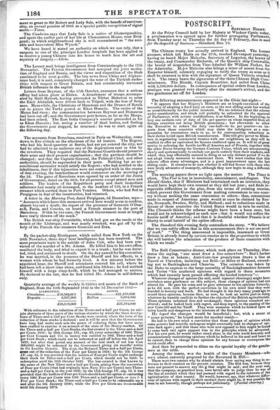The Brill Conservative dinner, which took place on Thursday, illus-
trates the saying, "one must draw a line somewhere": Box's barber drew a line at bakers ; Anti-Corn-law proselytism draws a line at Yeovil or Clevedon, including not Brill—at Miles or Rutland, extend- ing not to Buckingham and Chandos. The occasion was taken by the Duke to express to the large assembly of Buckinghamshire farmers and Tories "his unaltered opinions with regard to those measures which had recently been passed affecting the landed interests"— Whatever changes of opinion (he said, amid repeated cheerings) might have overtaken some gentlemen on this subject, those changes of opinion had not altered his. He gave his votes and he gave utterance to his opinions formerly, as he did now, with the perfect conviction in his own mind that they were founded in honesty and truth. He had thought it his duty many years ago. to record those opinions, because then, as now, he took an active part in doing whatever he humbly could do to further the Objects of the British agriculturists. Those opinions remained firm and unchanged; those opinions remained un- altered ; and he looked bark with regret, and deep regret, to the passing of the new Corn-bill and the Tariff. They were measures which he looked upon as being hostile and dangerous to the interests of the farmer. He hoped the changes would be beneficial ; but, with a sneer at " some persons," he hoped more for another result— He had in his own mind a conviction that those changes of opinion which some persons had recently undergone might eventually lead to changes of opi- nion back again ; and that those who were now opposed to him might be found come back and again support him in the principles which he advocated. For his own part, he would rather stand alone in the wide world honestly and conscientiously maintaining opinions which he believed in his soul and heart to be correct, than to change those opinions for any honour or recompense the world could offer.
And then he proceeded to dilate on the special loyalty of the gentle- men at the table.
Among the toasts, was the health of the County Members—who were absent, austerely proposed by the Reverend B. Hill— There were two reasons why he should abstain from saying any thing in re- ference to their conduct on the present occasion. The first was, because they were not present to answer any this g that might be said; and the next was. that the company, as practical men, were better able to judge than he was of the line of conduct which they had pursued with regard to the interests of the agriculturists of that county. He would, however, say, that whatever differ- ence of opinion with regard to their conduct there might be, it was possible for men to act honestly, though perhaps not judiciously. (Partial cheering.)


























 Previous page
Previous page